|
|
|
Sort Order |
|
|
|
Items / Page
|
|
|
|
|
|
|
| Srl | Item |
| 1 |
ID:
129194
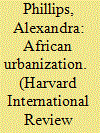

|
|
|
|
|
| Publication |
2014.
|
| Summary/Abstract |
Eko Atlantic is a city that rises "like Aphrodite from the foam of the Atlantic," wrote Nobel Prize winner Wole Soyinka. The city is defined by sustainability, luxury, technology, and economic opportunity. It is Africa's own Dubai; a gleaming gateway to the continent that will revolutionize the city of Lagos, solidifying its place as West Africa's financial center. The private development, which is located on land reclaimed from the Atlantic Ocean along
Lagos' upscale Bar Beach coastline, is predicted to house 400,000 residents and to provide over 150,000 jobs. Eko Atlantic is ushering in a wave of futuristic African cities. These modern satellite cities are built on the edge of existing metropolises in the hopes of transforming the country's economy and its role in the global marketplace. For example, developers are building Hope City outside Accra and Konza Techno City, known as "Africa's Silicon Savannah," outside Nairobi, in the hopes to turn Ghana and Kenya respectively into major players in the technology industry. African urbanization is occurring at a breakneck pace, and if done right, presents a valuable and unique opportunity to create jobs and lift millions out of poverty. However, if done wrong, the urban poor could become increasingly marginalized as slums are cleared to make way for housing they cannot afford and the mobile upper class migrates to upscale edge cities such as Eko Atlantic. Africa has the chance to urbanize in a way that increases the total populace's aggregate quality of life rather than deepening the divide between the tiny elite and the vast urban poor, but corruption and poor urban planning must first be overcome.
|
|
|
|
|
|
|
|
|
|
|
|
|
|
|
|
| 2 |
ID:
085910
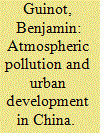

|
|
|
|
|
| Publication |
2008.
|
| Summary/Abstract |
Chinese cities face the challenge of battling air pollution during a time of rapid urbanisation and rising energy demand.Poor air quality is heightening anxiety over the environment.Given pollution's economic cost, a real policy of monitoring and control has emerged at the national level.
|
|
|
|
|
|
|
|
|
|
|
|
|
|
|
|
| 3 |
ID:
115335
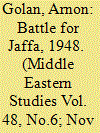

|
|
|
|
|
| Publication |
2012.
|
| Summary/Abstract |
Modern armies conduct military operations in urban areas, but rarely do so willingly. Military commanders prefer fighting in open terrain in which forces freely maneuver and use firepower, rather than in urban areas in which obstacles such as tall buildings, narrow streets, and non-combatants hinder control of the battlefield. Most professional military literature recommends refraining from fighting in urban areas and considering urban battles an unfortunate aberration to be avoided in the future. Deliberate choice of an urban battlefield is quite exceptional, deriving mostly from strategic needs or due to the symbolic value ascribed to a particular city or town. Most decisive battles of the first Arab-Israeli war in 1948 were fought in open areas. However, strategic and political considerations, as well as cultural and sentimental, caused both sides to fight in cities and towns, such as in the case of Jaffa and Tel Aviv metropolitan area, Palestine's major economic center and a main road junction. Both cities also held sentimental value: the dynamically developing modern Jaffa was a symbol of an emerging Palestinian nation while Tel Aviv, the "first Hebrew city," was the Zionist ideal of urban development.
|
|
|
|
|
|
|
|
|
|
|
|
|
|
|
|
| 4 |
ID:
131549
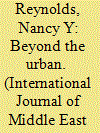

|
|
|
|
|
| Publication |
2014.
|
| Summary/Abstract |
Studies of public space focus disproportionately on cities. Complex and densely populated urban built environments-with their streets, plazas, institutional buildings, housing projects, markets-make concrete and visible attempts to manage difference. They also structure the ways that less powerful residents challenge and sometimes remake elites' spatial visions of the social order. The robust literature in Middle East studies on Islamic cities, colonial cities, dual cities, quarters and ethnicities, port cities, and so forth is no exception to this urban focus.
|
|
|
|
|
|
|
|
|
|
|
|
|
|
|
|
| 5 |
ID:
133205


|
|
|
|
|
| Publication |
2014.
|
| Summary/Abstract |
Like a cross between a dystopian nightmare where machines have taken over the world and an archaeological dig gone awry, the once pristine thoroughfare that ran from the Jehangir Kothari Parade through Shahrah-e- Firdousi now lies in shambles. Concrete structures stand half-finished, while iron rods jut out of the earth and electricity wires and sewage pipes lie strewn about.
|
|
|
|
|
|
|
|
|
|
|
|
|
|
|
|
| 6 |
ID:
031385
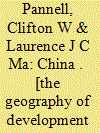

|
|
|
|
|
| Publication |
London, Edward Arnold Publishers Limited, 1983.
|
| Description |
ix, 342p.hbk
|
| Series |
Scripta Series in Geography
|
| Standard Number |
071316302X
|
|
|
|
|
|
|
|
|
|
|
|
Copies: C:1/I:0,R:0,Q:0
Circulation
| Accession# | Call# | Current Location | Status | Policy | Location |
| 023140 | 951/PAN 023140 | Main | On Shelf | General | |
|
|
|
|
| 7 |
ID:
101040
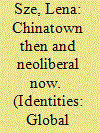

|
|
|
|
|
| Publication |
2010.
|
| Summary/Abstract |
This article explores the intersection of cultural tourism, gentrification, and urban development in the neoliberal period by examining the complex and ambivalent relationship between an "ethnic-specific" cultural institution and a rapidly gentrifying neighborhood. Through a case study of the Museum of Chinese in America's (MoCA) profile, history, and community involvement in Manhattan's Chinatown, this article suggests that small to midsize ethnic-specific museums relate to the social and spatial transformations inherent in gentrification through a mechanism called gentrification consciousness. This mechanism helps to explain how an institution whose history, mission, and politics might indicate a resistance to gentrification is confounded and constrained by the larger neoliberal landscape. Offering little in the way of substantive alternative funding and space, neoliberal urban development touts tourism and culture as key routes to economic development with gentrification as a "natural" and beneficial by-product of such development for both the surrounding neighborhood and for individual cultural institutions. An analysis of the unique relationship of smaller ethnic-specific organizations to gentrification processes complicates discussions about museums and gentrification as well as potentially identifying methods and measures of institutional success that do not rely so heavily on neoliberal logics and policy prescriptions.
|
|
|
|
|
|
|
|
|
|
|
|
|
|
|
|
| 8 |
ID:
111876
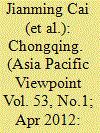

|
|
|
|
|
| Publication |
2012.
|
| Summary/Abstract |
The spectacular growth of Chinese cities since the 1980s is often theorised as reflecting the advantages of latecomer development (ALD). ALD has been more effective in cosmopolitan, globally accessible coastal cities than outer cities. As leading cities, like Shanghai, close the development gap, the potential for 'easy' ALD growth falls off rapidly. Because institution building is more difficult than firm-based growth, ALD strategies may generate rapid short-term economic growth but not sustainable development. Accordingly, Chongqing municipality, with a population of 33 million, in West China, is pursuing a beyond latecomer advantage model. This is characterised by: (i) reducing poverty and rural-urban disparity through accelerated urbanisation, rural-urban integration and emphasising human resource development; (ii) upgrading the value added of Chongqing's economy through targeting of FDI and incentives to local start-ups; (iii) endogenous development, reducing risks from external shocks; (iv) Hukou reform; (v) establishing a land use conversion certificate market to rationalise land use; (vi) emphasis on morality to address crime/corruption; (vii) recognition of the importance of amenity in attracting investment and talent; and (viii) establishing a longer developmental time perspective. This paper explores this Chongqing model in detail.
|
|
|
|
|
|
|
|
|
|
|
|
|
|
|
|
| 9 |
ID:
124416
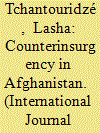

|
|
|
|
|
| Publication |
2013.
|
| Summary/Abstract |
After a decade of bloodshed and suffering, the western-sponsored coalition in Afghanistan led by the North Atlantic Treaty Organization (NATO) has failed to win the "hearts and minds" of locals. The tremendous sacrifices by the United States, Canada, and their allies have produced some tangible results, but steps forward have been made on the shaky ground of overall insecurity and violence and have primarily been associated with certain urban developments, while most of Afghanistan remains deeply rural in its feudal social order and conservative Islamic traditions. Although the Canadian experience in Afghanistan has been very different in its scope and objectives from the Soviet Union's operations of the 1980s, certain important parallels, particularly concerning counterinsurgency, can be discerned.
|
|
|
|
|
|
|
|
|
|
|
|
|
|
|
|
| 10 |
ID:
188227
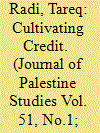

|
|
|
|
|
| Summary/Abstract |
Since 2007, the Palestinian Authority has implemented a strategy of financialized urbanization in response to economic crises precipitated by Israel’s settler-colonial stranglehold on the Palestinian economy. This article argues that financialized urbanization operates as a mechanism to expand the local banking sector and as a modality of settler-colonial alienation. Examining the joint-ownership structures of companies whose activities straddle real estate and financial markets, the article shows where land ownership in the West Bank ultimately lies. The study highlights qualitative changes in money lending and the extended reach of finance to emphasize the risks of financial collapse. Understanding finance capital and settler colonialism as systems predicated on managing risk for maximum returns, the discussion draws their relation to each other into a single analytical framework to center the question of land dispossession and racialization at the heart of financialized urbanization.
|
|
|
|
|
|
|
|
|
|
|
|
|
|
|
|
| 11 |
ID:
128527
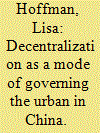

|
|
|
|
|
| Publication |
2013.
|
| Summary/Abstract |
This paper considers what a Foucauldian-informed analysis of decentralization and urban transformation offers to current debates. It analyzes decentralization as a new regime of governing, in contrast to many studies that treat it as a policy process, objective or outcome aimed at alleviating some problem of centralized authority. Rather than understanding decentralization as less state governance, this paper asks how practices such as local autonomy are in fact technologies of governing the urban. Decentralization is analyzed then not simply as an absence of some central state power, either in the political or fiscal realm, but rather, as new mechanisms of governing the urban, which are linked with the regulation and constitution of subjects. The paper focuses on an aspect of decentralization that typically is under-examined: the decentralization of welfare provisioning in urban China. Under high socialism of the Maoist era, social services for urban residents were distributed by the state, through the work unit (danwei) as part of the planned economy. In recent years, however, major reforms have been put into place to diversify the ways in which social services are delivered, under a general rubric of decentralizing the distribution away from the state. Based on anthropological research in Dalian, a major port city in northeast China, this paper examines a new social practice and subject form that has emerged with new ways of caring for those in need in the city: volunteerism. By focusing on this resulting social form, the paper argues that we may better understand how decentralization is not a singular process with multiple outcomes, but rather, a complex assemblage of elements that includes technical questions about how to govern as well as normative practices of subject formation. An analytical disaggregation of these elements also allows us to avoid the assumption that decentralization necessarily contains certain characteristics, or that it will lead to particular kinds of political and social forms.
|
|
|
|
|
|
|
|
|
|
|
|
|
|
|
|
| 12 |
ID:
128524
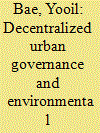

|
|
|
|
|
| Publication |
2013.
|
| Summary/Abstract |
This paper explores how decentralization has created a "local political arena" and has been transforming governance in the environmental management sector in South Korea. Korea has been known as a developmental state where the strong central government and businesses have conspicuously dominated during most of its industrialization period. Yet, the deepened democracy, global competitiveness and fiscal austerity have pressured central political stakeholders to devolve highly centralized functions and authority to local bodies since the mid-1990s. The building of democratic institutions at the local level, including directly elected mayors and city councils, has created room for local politics and diminished central political leverage over local affairs. The national economic crisis has highlighted the inefficiency of the centralized system and encouraged further administrative and fiscal decentralization under the democratic governments. In this issue image_86_4_Baecontext, while the central government and big businesses continue to have a significant say in policy making, local executives, with their expanded decisional authority and resources, are trying to improve the images of their cities and to take responsibility for promoting urban economies and improving quality of life in the age of trans-border links and competition. This paper analyzes the case of Ulsan, where Hyundai and several other conglomerates are located and which has been a symbol of state-led industrialization during most of the development period. Despite the large role played by the centre in the development of Ulsan, the empowered mayor of the city has successfully turned citizens' attention to post-industrial aspects of governance for ensuring the future competitiveness of the city in global markets by orchestrating collaborative implementation of environmental policies. The paper explores how this governance shift in Ulsan has led successful collaborative environmental change by mobilizing local businesses, civic organizations and general citizens who might not have been interested in the making of an "environment-friendly city
|
|
|
|
|
|
|
|
|
|
|
|
|
|
|
|
| 13 |
ID:
133105
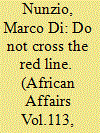

|
|
|
|
|
| Publication |
2014.
|
| Summary/Abstract |
Only five years after it lost a national election in Addis Ababa, the overwhelming victory of the Ethiopian People's Revolutionary Democratic Front (EPRDF) in the 2010 general elections marked the defeat of the opposition parties and the return to a dominant-party state. The capacity of the EPRDF to mobilize people in towns and the capital city triggered debates on the nature of consent in urban Ethiopia. This article contributes to this debate in two ways. First, it maps the specific institutions and strategies the ruling party has used to close political space in the capital since 2005, explaining how it has tied political mobilization to the delivery of services to those at the bottom of urban society. Second, it examines interactions between the ruling party and young people involved in government development programmes and youth organizations, demonstrating the subtle ways dissent is expressed even as EPRDF power is reproduced. In this regard, the victory of the ruling party in 2010 does not bear witness to the neutralization of dissent. Rather, it reveals a reshaping of the way the government has governed and controlled the city since the late 1990s.
|
|
|
|
|
|
|
|
|
|
|
|
|
|
|
|
| 14 |
ID:
127301
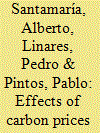

|
|
|
|
|
| Publication |
2014.
|
| Summary/Abstract |
This paper assesses the impacts on the cement, steel and oil refining sectors in Spain of the carbon prices derived from the European Emissions Trading Scheme (EU ETS), and the potential effect on these sectors of the European Union anti-leakage policy measures. The assessment is carried out by means of three engineering models developed for this purpose. Our results show a high exposure to leakage of cement in coastal regions; a smaller risk in the steel sector, and non-negligible risk of leakage for the oil refining sector when carbon allowance prices reach high levels. We also find that the risk of leakage could be better handled with other anti-leakage policies than those currently in place in the EU.
|
|
|
|
|
|
|
|
|
|
|
|
|
|
|
|
| 15 |
ID:
127234
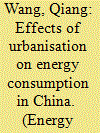

|
|
|
|
|
| Publication |
2014.
|
| Summary/Abstract |
As a key issue in China's economic development, urbanisation creates increasing pressure on energy supply and the natural environment. Thus, a better understanding of the relationship between urbanisation and energy consumption is necessary for Chinese decision makers at various levels to address energy security and sustainable economic and social development. This paper empirically investigates the effects of China's urbanisation on residential energy consumption (REC) and production energy consumption (PEC) through a time-series analysis. The results show that compared with rural areas, urbanisation slows per capita REC growth because of the economy of scale and technological advantages associated with urbanisation but has greater promotional effects on the growth of REC and the improvement of REC structure. The economic growth caused by urbanisation most significantly contributes to an increase in PEC, whereas technological advancement was found to reduce the scale of PEC (except from 2001 to 2005). Finally, the structural effect of the energy supply increased rather than decreased China's PEC, and the effect of industrial structure adjustment on PEC was found to be insignificant.
|
|
|
|
|
|
|
|
|
|
|
|
|
|
|
|
| 16 |
ID:
129102
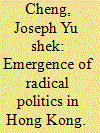

|
|
|
|
|
| Publication |
2014.
|
| Summary/Abstract |
This article reviews the literature on the radicalization of politics in Hong Kong. with an emphasis on its causes and impact. Evidence on the deteriorating living standards and the widening of the gap between the rich and the poor has been substantial. People naturally blame the government under such circumstances. They have been especially angry with government policies favoring the business community. and the "greed" and corruption of the Donald Tsang and C. Y. Leung administrations. The consensus on the origins. characteristics, modes of operation. and so on of the new social movements is strong: and the same applies to the failure of the government to anticipate and absorb their challenges. Confidence in the maintenance of social stability remains high. but there is little optimism that the performance of the govemment will soon improve.
|
|
|
|
|
|
|
|
|
|
|
|
|
|
|
|
| 17 |
ID:
120630
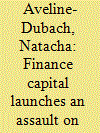

|
|
|
|
|
| Publication |
2013.
|
| Summary/Abstract |
Over the past two decades, global market finance has taken root in China to seek property investment. This article examines the spatialities and anchorage methods of finance capital within Chinese national territory. It highlights the spatial and sectoral differences in the composition of property portfolios as a function of the return/risk coupling. These differences are exacerbated by a split in the geographical origin of the funds, which determines differentiated conditions of access to land and management of the investment time horizon of the assets portfolios. The penetration of finance capital into urban space tends to increase the fragmentation and functional specialisation of districts, a phenomenon fostered by entrepreneurial urban policies. As a result, urban projects are becoming standardised in terms of both design and program. They are increasingly governed by external references that favour the expansion of multinationals and transform lifestyles and consumer habits.
|
|
|
|
|
|
|
|
|
|
|
|
|
|
|
|
| 18 |
ID:
152167
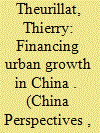

|
|
|
|
|
| Summary/Abstract |
Illustrated by a case study on the urban development of a medium-sized city in China, this article develops a theoretical framework to help understand the role the financial system plays in the urban development model based on land in China. Three fields of literature have been used in order to link the various mechanisms between land, urban infrastructure, property development, and financing channels in urban production. The case study illustrates the many interactions between local government and real estate businesses, both state and private, as well as local banks, in order to create urban infrastructure that responds to “communal and public” needs and real estate objectives of a “private and individual” nature. In doing so, it highlights the fundamental role of capital in urban production in China.
|
|
|
|
|
|
|
|
|
|
|
|
|
|
|
|
| 19 |
ID:
123140
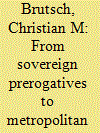

|
|
|
|
|
| Publication |
2013.
|
| Summary/Abstract |
What roles do, can and should cities and their agents play on the international stage? Has the "rescaling" of political authority expanded urban governments' foreign policy space? Can the advocates of urban empowerment exploit cities' growing economic clout to harness urban development? To answer these questions, and to shed light on the international frontiers of metropolitan governance, this study explores the frictions between cities' foreign ambitions and states' collective efforts to preserve their sovereign rights and prerogatives. It proceeds in two parts: to probe the anarchical society's stake in the urban age, the first part maps the transnational activities of cities and their agents. It discusses urban aspirations, surveys foreign engagements and reviews their salience and limitations. To gauge states' collective response to the tentative expansion of metropolitan rule, the second part examines on what terms UN-Habitat, the Cities Alliance and the World Bank harness urban development in poorer and more fragile parts of the world. The study concludes with a critique of the view that international relations are bound to orbit local concerns.
|
|
|
|
|
|
|
|
|
|
|
|
|
|
|
|
| 20 |
ID:
122975
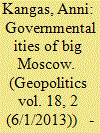

|
|
|
|
|
| Publication |
2013.
|
| Summary/Abstract |
In the summer of 2011, the Russian state initiated a project to significantly expand the size of its capital, Moscow, developing it into a polycentric urban formation and a 'global city'. This article approaches the global city as a circulating form of governmentality by way of analysing discussions prompted by the plan for Big Moscow. It proposes that the logic of optimisation at work in the plan implies that it can be characterised as a neoliberal reform. The focus of the essay is on how neoliberalism becomes particularised in the context of the analysed discussions as it gains backing from constellations of authoritarian politics or historically rooted forms of cultural understanding. This does not render the examined case an anomaly but rather provides a paradigmatic example of how the productive entwinement of seemingly disparate governmental techniques is a necessary effect of the installation and functioning of the neoliberal regime.
|
|
|
|
|
|
|
|
|
|
|
|
|
|
|
|
|
|
|
|
|